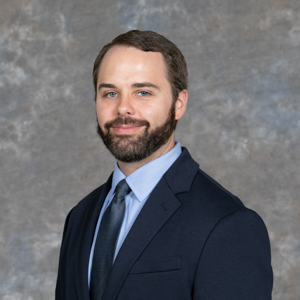 A faculty member who finds joy in helping undergraduates succeed has earned Lander University’s Junior Faculty Scholar Award.
A faculty member who finds joy in helping undergraduates succeed has earned Lander University’s Junior Faculty Scholar Award.
Dr. Matthew Malone, who joined Lander’s faculty in 2017 as an assistant professor of political science and homeland security, came to the University with a passion for teaching, the experience of a few conference presentations and a completed dissertation for his doctoral degree.
In six years, Malone has published five peer-reviewed journal articles and six book review notes. He has made presentations at 13 state, regional and/or national conferences – and recently was promoted to associate professor with tenure. Along with his ongoing research projects, Malone is the coordinator of the Homeland Security undergraduate minor and the program coordinator for the master’s degree program in Emergency Management.
He finds that his research and teaching go hand in hand. “I teach courses in public administration, homeland security and emergency management,” he said. “My research touches on various aspects of each.”
A recent publication, for example, examined disaster preparedness sales tax holidays and why states might choose to enact such policies. “This ties into state and local government, public budgeting, fundamentals of emergency management and other courses I teach,” Malone said. “By conducting research that aligns with my teaching, I improve as both a scholar and teacher.”
The Junior Faculty Scholar Award “is a validation of hard work over the past six years,” he said. “I wholly reformed my research agenda after my first year at Lander, so this solidifies that I made the correct decision by doing so.”
Malone was drawn into the field of public administration because of the opportunities to “focus on being a part of something bigger than yourself and putting the common good first and foremost,” he said. “I wanted to understand -- and still want to better understand -- why individuals choose to work in state and local government and how individuals and organizations operate within those same levels of government.”
Those interests led him to emergency management. Malone, who earned a bachelor’s degree in history and political science from the University of North Alabama in 2008, went on to earn a master’s degree in public affairs from the University of Alabama-Huntsville in 2010. At that point, he knew he would pursue studies for a doctoral degree, and looked at opportunities to gain practical experience that would be beneficial for his long-term career.
In 2012, Malone began working at the Alabama Emergency Management Agency, which was in the midst of helping communities, businesses and public agencies recover from the aftermath of a tornado outbreak that occurred the year before. The disaster claimed the lives of at least 240 people across multiple counties in Alabama.
“This led to the demand for additional employees at the agency to work in disaster recovery,” said Malone, whose father had been a public works employee and was no stranger to disaster recovery in his career.
“It was a perfect fit,” reflected Malone. “Years later, the position in emergency management opened at Lander and seemed written or me. It called for someone to teach public administration and emergency management. I had academic and practical experience in both, and so here I am today.”
Dr. Lucas McMillan, dean of the College of Social and Behavioral Sciences, described Malone as a “generous colleague who embraces the role of servant-leader.”
McMillan noted that Malone’s publications have contributed to the understanding of public policy, politics and emergency management. “Dr. Malone’s research helps us to better understand the roles and motivation of emergency managers, as well as the implications of some public policies,” he said. “His scholarship furthers his ability to teach political science and emergency management courses to undergraduate and graduate students, as well as his ability to mentor students.”
Lander’s Emergency Management Program has grown not only in the number of students -- but also in quality -- through Malone’s leadership, McMillan said.
“He has integrated many types of materials and assignments and paired courses with continuing education programming offered by the Federal Emergency Management Agency (FEMA), a decision which means that Lander’s EMGT graduates obtain professional credentials that persons in this burgeoning field will understand and value, along with their Lander degree,” McMillan said. “Graduates of our program have been very successful in gaining promotions in their current field, as well as finding new positions.”
Malone has an impressive record of University and community service. Among his numerous activities, he is the president of the South Carolina Political Science Association and a reviewer for “Choice Magazine” and the “International Review of Administrative Sciences.” He is campus advisor for the Political Science Association at Lander and is a volunteer youth soccer coach with YMCA of the Lakelands. He also volunteers with the Greenwood County Emergency Management Agency during activations of the county’s Emergency Operations Center.
As Malone strengthens his research program at Lander, he is pleased that the University affords him the opportunity to teach and pursue his scholarly interests. “I always knew that I wanted to focus on students/teaching first and research second,” Malone said.
“Lander was the ideal institution to pursue that passion. While this is a research award, and I pride myself on conducting sound research, I get my joy from working with our undergraduates and seeing them succeed. It means more to me to get to know a student and help them get into the workforce or graduate school than it does to publish research.”
By working with students, Malone is accomplishing his “common good” goal.
“I see no better way of doing that than by helping ensure society has capable and productive members of society going forward,” he said.